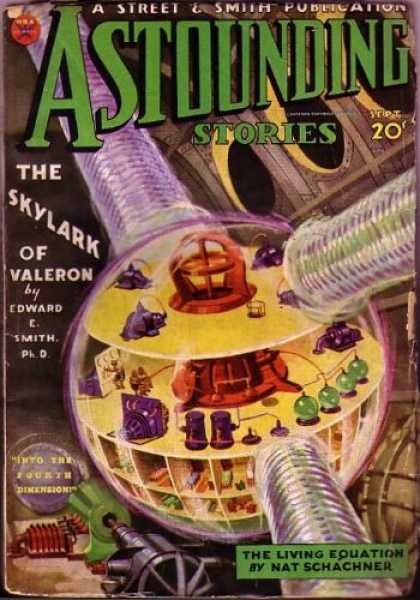|
LITR 4368 Literature of the Future |
Sample answers
for Essay 1:
|
 |
Sarah
Hurt
July
10, 2015
To Entertain, to Instruct, or Something In-between
When comparing the styles associated with the different visions/scenarios
of the future, specifically that of alien contact stories and utopias, one is
generally seen as more about entertainment while the other is considered more
instructional or thought provoking. However, both alien contact stories and
stories that focus on utopias can be a combination of both entertainment and
instruction as I discovered while reading the short stories assigned for the
second half of the class.
Alien contact stories typically are set either on Earth where aliens are
invading, or in outer space and deal with exploration. These works also tend to
fall into the romance narrative category and more often than not feature male
protagonists who are superior to others when it comes to physical fitness,
intellect, and skills, and are not afraid of anything. The protagonists in these
stories are often similar to “the heroic cowboy on the western frontier” (Alien
contact page), and will almost always live to the end of the story. It is
because of these typically standard concepts within the alien contact scenario
that the works are “perennially the most popular theme of standard science
fiction” (Alien contact page) and seen as more for entertainment than
intellectual.
Stories that focus more on utopias, specifically ecotopias generally
feature very different types of characters compared to alien contact stories. A
great example of how different utopian characters are described is within
“Chocco” which features characters that are labeled more by their job title than
individual or personal names. “Most utopian citizens fade into the system's
background, or appear more as functions or officials within the community rather
than the individualized, conflicted selves” (Utopia page) compared to alien
contact stories that tend to focus more on the individual. Alien contact stories
or space exploration works further distance themselves from Utopias when they
feature dystopia or apocalyptic like settings and don’t focus on more than the
lifetime of the individual protagonist or even just one day compared to
utopia/ecotopia works that focuses on sustainability and long term goals.
Utopia/ecotopia concepts can feature post-apocalyptic or dystopian worlds the
way that The Parable of the Sower
did, but Lauren’s idea of Acorn fits within the long term ecotopia mold of hope
for the future.
Ideally a work should both entertain and instruct, however most works do
not have a perfect balance of the two. Sometimes a work can be disguised as
entertainment when it is much more instructional or thought provoking than you
might notice with just a quick glance. This is the case with the alien contact
story, or really the lack of contact, within “They’re Made out of Meat”. Almost
everyone in class seemed to really like this story and thought it was funny and
thus entertaining, but like good science fiction it makes the reader really
think about what we are and what an alien might see us as. “The Poplar Street
Study” with its invasion of scientist aliens who wish to study humans also
features both entertainment and instruction. The story had some rather funny
moments and got a large part of the class to talk about the idea of humans being
treated the way that humans generally have treated animals (or those we have
thought of as lesser at the time). This ties back to the idea of how alien
contact movies can sometimes feature actions by aliens that are similar to
actions associated with colonialism, making alien contact stories possible
commentary on what it means to be human and the consequences of our actions.
Works that focus on Utopias/ecotopias can also be forms of commentary;
however, these stories tend to focus less on the entertainment factor, possibly
because they tend to lack the large conflicts involved in dystopia literature
which make a work more exciting. “Chocco” for example, while there is at least
some mystery because it involves a contest, is much more instructional or
thought provoking than entertaining. The other ecotopia that we read “House of
Bones” featured a common utopia plot device by having an outsider come into the
community and after “experience with utopian guides or citizens, the
visitor-hero is subsequently re-educated and converted or absorbed into the
community“ (Utopia page). While the narrator likes the community he is in, he
does not fully understand them. Once he realizes that they did not want him to
kill the Neanderthal, he can be fully accepting of them and they can fully
accept him into their community. On the day that Hannah Wells came to present we
discussed how ecotopias, like “Chocco” can be difficult to read due to their
lack of entertainment, but these works can bring up ideas that are very
thought-provoking. Ecotopias lack of action and large amount of dialogue
sometimes with the Socratic Method built into the story can make for slow
reading but great classroom discussion if you can only get the class to actually
do the reading. Hannah Wells also discussed during her presentation other
utopias and why dystopias are so much more likely to be accepted as teaching
material. Utopias can be seen as communist or socialist because they focus less
on individual freedoms and emphasize the importance of the whole community which
is threatening to many Americans making Utopias even more difficult to teach.
For the most part alien contact scenarios can be more entertaining than
instructional while utopia/ecotopia scenarios can be more instructional than
entertaining. However it is important to recognize that works can be both
entertaining and instructional, and not to discount the possibility of an
entertaining work to be educational or an educational work being entertaining.
After all, “the purpose of literature is "to entertain and
educate"--distinct but not exclusive purposes” (Horace page).
